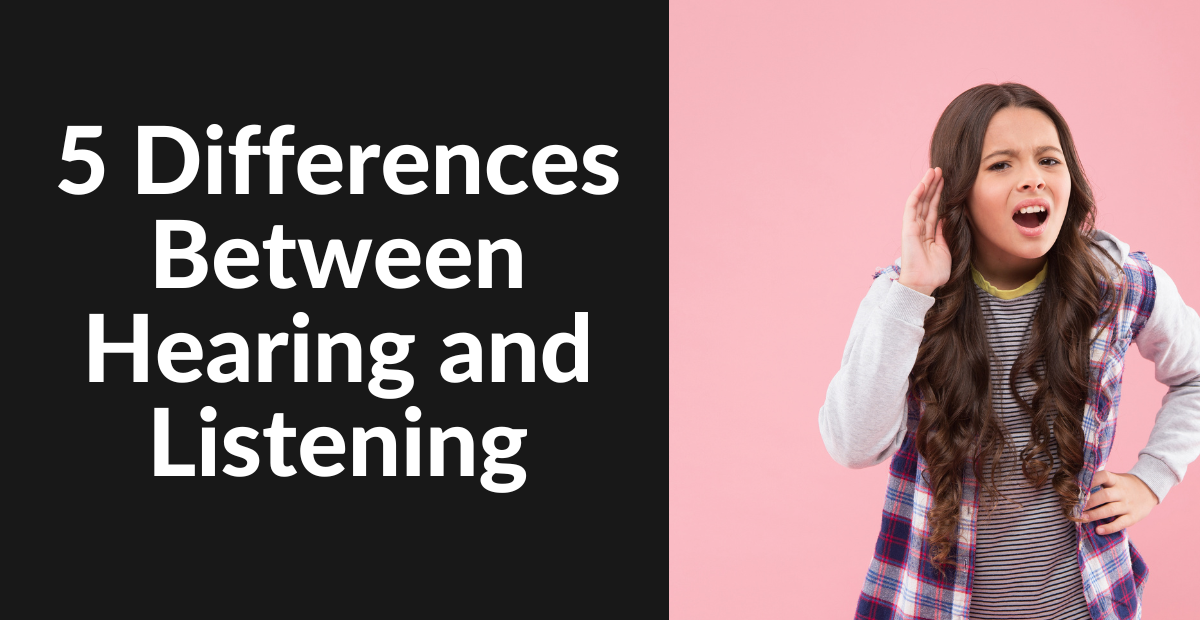When it comes to communication, hearing and listening are two essential aspects that play distinct roles. While they may seem similar, there are fundamental differences between hearing and listening that can significantly impact the effectiveness of our interactions.
In this article, we will explore the five key differences between hearing and listening, shedding light on how each process affects our understanding and communication skills.
What Is Hearing?
Hearing is the biological ability to perceive sound through our ears. It is an involuntary process that occurs naturally in most individuals. When we hear, our ears receive sound waves and transmit them to the brain for processing. Hearing enables us to detect sounds, including speech, music, and environmental noise.
What Is Listening?
Listening, on the other hand, goes beyond the physical act of hearing. It involves actively paying attention and making an effort to comprehend and interpret the sounds we hear.
Listening requires concentration, focus, and engagement with the speaker or the audio source. It is a cognitive process that involves processing and understanding the information conveyed through sound.
The Five Differences Between Hearing and Listening

Here are 5 differences between hearing and listening:
1. Attention and Focus
Hearing is a passive process that occurs naturally, even when we are not consciously paying attention. We can hear sounds in our surroundings without actively engaging with them. Listening, however, requires intentional focus and attention.
It involves directing our mental resources toward the speaker or the audio source, filtering out distractions, and concentrating on the message being conveyed.
2. Comprehension and Understanding
Hearing allows us to detect sounds, but it does not guarantee comprehension or understanding. We may hear words or sentences without fully grasping their meaning.
Listening, on the other hand, aims to comprehend and understand the information being communicated. It involves deciphering the message, analyzing its context, and processing the meaning behind the words.
3. Interpretation and Analysis
While hearing provides us with raw auditory input, listening involves interpretation and analysis. When we listen, we go beyond the surface-level sounds and try to extract deeper meaning from the message. We consider the tone, intonation, and body language of the speaker to gain a comprehensive understanding of what is being communicated.
4. Response and Feedback
Hearing typically does not require a response or feedback. It is a passive process that happens automatically. Listening, however, involves active participation and engagement.
It requires us to provide feedback, whether through verbal or non-verbal cues, to indicate that we have understood the message. Effective listening often involves asking questions, seeking clarification, and offering relevant responses.
5. Memory and Retention
Hearing alone does not guarantee memory or retention of information. We may hear something momentarily but quickly forget it. Listening, on the other hand, enhances memory and retention.
When we actively engage in the listening process, we are more likely to remember and retain the information conveyed to us. This is why active listening is crucial in educational settings, professional environments, and interpersonal relationships.
Frequently Asked Questions (FAQs)
Is hearing the same as listening?
No, hearing and listening are not the same. Hearing refers to the biological process of perceiving sound, while listening involves actively paying attention, comprehending, and interpreting the sounds we hear.
Can listening skills be improved?
Yes, listening skills can be improved with practice and conscious effort. By developing active listening techniques, such as maintaining eye contact, paraphrasing, and avoiding distractions, we can enhance our ability to listen effectively.
Why is listening important in communication?
Listening is vital in communication because it fosters understanding, promotes empathy, and reduces misunderstandings. Active listening helps build stronger relationships, encourages open dialogue, and enhances overall communication effectiveness.
What are the benefits of effective listening?
Effective listening has numerous benefits, including improved comprehension, stronger relationships, enhanced problem-solving abilities, and increased productivity. It fosters mutual respect, encourages collaboration, and promotes successful outcomes in various contexts
Can listening skills impact professional success?
Yes, listening skills can significantly impact professional success. Active listening is highly valued in the workplace as it enhances teamwork, improves customer interactions, and increases overall productivity. Good listeners are often regarded as reliable, approachable, and effective communicators.
How can I become a better listener?
To become a better listener, start by practicing active listening techniques. Focus on the speaker, maintain eye contact, avoid interrupting, and provide feedback. Minimize distractions and genuinely engage with the content being conveyed.
Last Words
In conclusion, while hearing and listening are related, they are distinct processes with crucial differences. Hearing is the natural ability to perceive sound, whereas listening is an active, cognitive process that involves comprehension, interpretation, and engagement.
By understanding and practicing effective listening skills, we can enhance our communication abilities, build stronger relationships, and navigate the complexities of human interaction.
